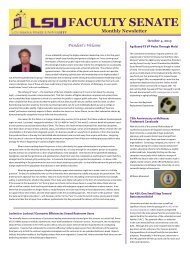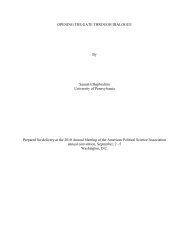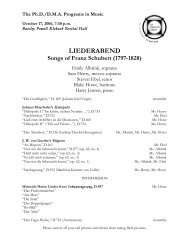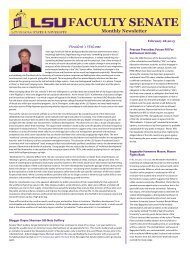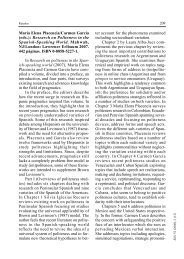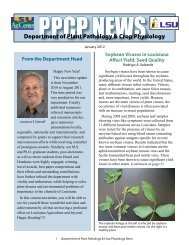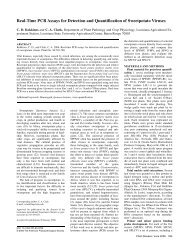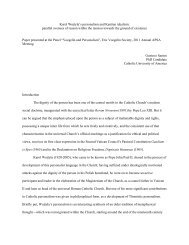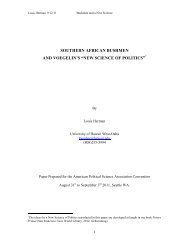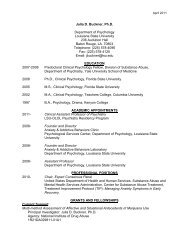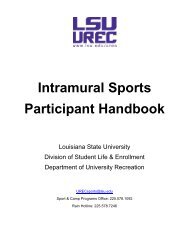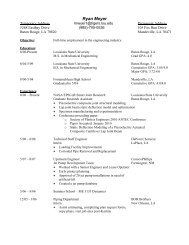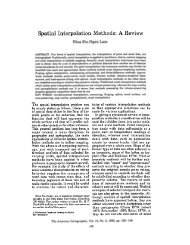Nicoletta Stradaioli, University of Perugia - Louisiana State University
Nicoletta Stradaioli, University of Perugia - Louisiana State University
Nicoletta Stradaioli, University of Perugia - Louisiana State University
Create successful ePaper yourself
Turn your PDF publications into a flip-book with our unique Google optimized e-Paper software.
A European Experience in the South: Eric Voegelin, the Southern<br />
Agrarians and Common Sense Philosophy.<br />
<strong>Nicoletta</strong> <strong>Stradaioli</strong><br />
<strong>University</strong> <strong>of</strong> <strong>Perugia</strong><br />
Prepared for delivery at the 2012 Annual Meeting <strong>of</strong> the<br />
American Political Science Association, August 30-September 2, 2012.<br />
© Copyright by the American Political Science Association<br />
1
Introduction:<br />
The purpose <strong>of</strong> this research paper is tw<strong>of</strong>old. First to examine Eric Voegelin’s<br />
treatment <strong>of</strong> common sense philosophy, especially its role in the foundation <strong>of</strong> an<br />
innovative political science. In this context, Voegelin’s formative years in the United<br />
<strong>State</strong>s and his early reflexions on the “intellectual formation” <strong>of</strong> the American society,<br />
discussed in the book On The Form <strong>of</strong> the American Mind, will also be considered.<br />
Secondly, I will link Voegelin’s analysis <strong>of</strong> common sense philosophy to the<br />
Southern Agrarian tradition. Voegelin had a strong connection with the South and, even<br />
if he was not a southerner, his years in Baton Rouge were one <strong>of</strong> the most significant<br />
periods for his philosophical speculation and the acquaintances he made. I will<br />
demonstrate the Agrarian perspective to common sense philosophy. The argument is not<br />
that Southern Agrarian conservatism can be likened to the Scottish common sense<br />
tradition. I do not want to claim historical continuity. It is only that Scottish common<br />
sense and Southern Agrarianism (via antebellum intellectuals), distinct as they are, are<br />
movements that have some similarities. In particular, I intend to focus upon the<br />
Agrarians’ perspective about literature and the philosophical import <strong>of</strong> literature<br />
considering its crucial importance in helping to address the crises <strong>of</strong> modern political,<br />
social and spiritual order.<br />
The questions for discussion are the following: what kind <strong>of</strong> common sense<br />
philosophy is present in Voegelin’s political thought? What is the role <strong>of</strong> common sense<br />
philosophy in Southern Agrarianism? Can the Southern Agrarian alternative vision <strong>of</strong><br />
American political and social life be regarded as a political theory connected to reality? Is<br />
it possible to build a coherent political theory on which to base practice from Agrarian<br />
thought?<br />
Voegelin and common sense philosophy:<br />
Voegelin first visited the United <strong>State</strong>s in 1924. Thanks to a Laura Spellman<br />
Rockefeller fellowship, the German scholar had the opportunity <strong>of</strong> studying in the United<br />
<strong>State</strong>s for two years – from 1924 to 1926. He began his work at Columbia <strong>University</strong>, where<br />
2
he attended the courses <strong>of</strong> Franklin Henry Giddings (sociology), John Dewey (pedagogy),<br />
Arthur W. McMahon (public administration) and Thomas Hunt Morgan (biology). In 1925<br />
he moved to Madison for the summer session at the <strong>University</strong> <strong>of</strong> Wisconsin. Here he met<br />
John R. Commons and Selig Perlam, who introduced him to American political history and<br />
labor history. Then, in the fall <strong>of</strong> 1925, Voegelin went to Harvard, where he attended the<br />
lectures <strong>of</strong> Alfred North Whitehead and studied American jurisprudence with Roscoe<br />
Pound. Finally, he visited Yale law School, studying with Arthur Corbin. In those American<br />
years another significant cultural stimulus came from reading George Santayana’s works.<br />
The American experience strongly influenced Voegelin’s way <strong>of</strong> philosophizing. As<br />
he says: «These two years in America brought the great break in my intellectual<br />
development. […] I discovered English and American common sense philosophy» and the<br />
«English and Scottish conception <strong>of</strong> common sense […] has remained a lasting influence in<br />
my understanding both <strong>of</strong> common sense and Classic philosophy. It was during this time<br />
that I got the first inkling <strong>of</strong> what the continued tradition <strong>of</strong> Classic philosophy and the<br />
common-sense level, without necessarily the technical apparatus <strong>of</strong> an Aristotle, could mean<br />
for the intellectual climate and cohesion <strong>of</strong> a society». 1 Voegelin immediately notices the<br />
uniqueness <strong>of</strong> the intellectual climate <strong>of</strong> the United <strong>State</strong>s and he conveys it through the<br />
volume, On The Form <strong>of</strong> the American Mind, published in 1928. The book went virtually<br />
unnoticed by the American public and the German academic environment gave it a cool<br />
reception. The style is, actually, not as clear as in the later Voegelinian works and its<br />
contents, which go from the discussion <strong>of</strong> time to American political and economic theories,<br />
made it a fragmentary collection <strong>of</strong> essays. However, the book shows the new<br />
epistemological basis <strong>of</strong> Voegelin’s interpretative analysis <strong>of</strong> socio-historical reality.<br />
The subject matter <strong>of</strong> his inquiry is the «intellectual formation» (geistige Gestaltung)<br />
<strong>of</strong> a specific society.<br />
By the term intellectual formation we refer not only to the larger, obvious phenomena, such as<br />
political institutions, art, works, factories, railroads, psychological therapies, and the like. The study<br />
must also take into account all aspects <strong>of</strong> everyday life, no matter how trivial: for example, the ships<br />
on the Hudson River tend to be painted a smudged red color, rather like bloodsausage, while boats<br />
on the Seine seem to prefer a more gentle tint; […]. Intellectual formations should show traces <strong>of</strong><br />
1 E. VOEGELIN, Autobiographical Reflections, Columbia and London, <strong>University</strong> <strong>of</strong> Missouri Press, 2006,<br />
pp. 56-57.<br />
3
their origin in a particular social body. But such a social body is itself merely the embodiment <strong>of</strong><br />
intellectual formations held together by traits peculiar to the form. 2<br />
Voegelin argues that the “form” <strong>of</strong> a society had to be based on the interrelationship<br />
<strong>of</strong> various mental expressions (philosophy, economy, law, etc.) that led to a same model<br />
which binds the entire social order into a unity. Therefore, instead <strong>of</strong> identifying the <strong>State</strong><br />
with the monarch or law with the Grundnorm, Voegelin refers to the intellectual formations<br />
which are at the root <strong>of</strong> the political organization. 3 To grasp society in all its richness it is<br />
necessary to focus on the self-reflection <strong>of</strong> society. According to Voegelin:<br />
[…] what is it we want to know when we look into a national mind and try to understand it? We<br />
want to know the nation’s attitude toward the essential questions <strong>of</strong> life […]. We want to know<br />
what it considers a valuable aim to pursue in life, its attitude toward death and God, its ideal <strong>of</strong><br />
humanity, its ideas about social relations within the body politic, about relations to other national<br />
units, its belief in its mission in history, what it thinks <strong>of</strong> itself. A scientifically worked out concept<br />
<strong>of</strong> a national mind has to answer these questions, […]. 4<br />
Thus, the (political) scientist must begin his investigation from the interpretation <strong>of</strong><br />
the inherent meaning <strong>of</strong> the material that he wants to study. He proceeds grasping from<br />
history the morphology <strong>of</strong> the national type <strong>of</strong> mind. As a matter <strong>of</strong> fact, the national type<br />
<strong>of</strong> mind is brought into existence by history itself. Thus, investigation has an empirical-<br />
experiential basis: the analysis <strong>of</strong> the intellectual formation is tied to personal and social or<br />
institutional expressions <strong>of</strong> mind which have an experiential foundation.<br />
In this respect, common sense is at the base <strong>of</strong> the American type <strong>of</strong> mind. According<br />
to Voegelin, the intellectual and political life <strong>of</strong> the United <strong>State</strong>s is not founded on a rigid<br />
doctrinal system, it was inspired by concrete political events which constitute the basis <strong>of</strong><br />
political life, such as the founding <strong>of</strong> the American Republic, the Declaration <strong>of</strong><br />
Independence and the adoption <strong>of</strong> the Constitution. An immediate perception, an original<br />
trust/belief in the historical roots <strong>of</strong> the basic principles <strong>of</strong> the democratic community<br />
prevail in the social and political scene. From Voegelin’s perspective, the political<br />
2<br />
E. VOEGELIN, On the Form <strong>of</strong> the American Mind, Baton Rouge and London, <strong>Louisiana</strong> <strong>State</strong> <strong>University</strong><br />
Press, 1995, pp. 5-6.<br />
3<br />
In The New Science <strong>of</strong> Politics Voegelin speaks <strong>of</strong> existential representation.<br />
4<br />
E. VOEGELIN, National Types <strong>of</strong> Mind and the Limits to Interstate Relations, in E. VOEGELIN, The Theory<br />
<strong>of</strong> Governance and Other Miscellaneous Papers 1921-1938, Columbia and London, <strong>University</strong> <strong>of</strong> Missouri<br />
Press, 2003, pp. 447-448.<br />
4
significance <strong>of</strong> common sense in the United <strong>State</strong>s emerges from the “sense <strong>of</strong> things in<br />
common” which is a prerequisite for a healthy moral and political life. Moreover, this sense<br />
<strong>of</strong> things that human beings and human communities have in common is grounded in the<br />
immediate knowledge <strong>of</strong> reality that is a mental capacity to recognize self-evident truths.<br />
These self-evident truths, on which common sense understanding is based, are not truths<br />
that are necessarily obvious to everyone, but are evident only to those who, with an<br />
unclouded vision, have detected and experienced their importance. 5 Hence, on the one hand,<br />
common sense is anchored in experience, concerning a contact with the world in its physical<br />
and mental dimensions, and on the other hand, is founded by experience because «it is the<br />
fruit <strong>of</strong> innumerable encounters with the world’s basic features and innumerable judgments<br />
both <strong>of</strong> fact and logic». 6<br />
Just as in the Scottish School, in Voegelin’s conception, common sense is «the ability<br />
<strong>of</strong> the normal man, reasonable man (the common man in the Anglo-Saxon sense) to behave<br />
rationally in the ordinary affairs <strong>of</strong> everyday life»; 7 and so it «must be understood in the<br />
sense <strong>of</strong> the Scottish School, especially Thomas Reid. For Reid, man is, in Cicero’s sense,<br />
rationis particeps; […] Common sense means the same as “a branch or degree <strong>of</strong> ratio”»<br />
and as a result «does not connote a social ballast <strong>of</strong> vulgar ideas […]. On the contrary, it is<br />
the habit <strong>of</strong> judgment and conduct <strong>of</strong> man formed by ratio; one could say it is the habit <strong>of</strong><br />
an Aristotelian spoudaios». 8<br />
For Voegelin, common sense is a necessary mental disposition for philosophizing,<br />
keeping philosophy anchored in direct experiences <strong>of</strong> reality. Hence, both as the capacity to<br />
recognize self-evident truths and as a body <strong>of</strong> knowledge constituted by self-evident truths,<br />
common sense is the condition for political science. The use <strong>of</strong> reason for the basic<br />
questions <strong>of</strong> order is the insight necessary for the correct modes <strong>of</strong> action concerning man’s<br />
existence in society. Common sense insights, which are «the lowest-ranking statements that<br />
directly interpret concrete experience», 9 range from the organization <strong>of</strong> government,<br />
5<br />
S.P. SEGREST, America and the Political Philosophy <strong>of</strong> Common Sense, Columbia and London, <strong>University</strong><br />
<strong>of</strong> Missouri Press, 2010, pp. 1-2, 21-24.<br />
6<br />
Ivi, p. 23.<br />
7<br />
E. VOEGELIN, Anamnesis. On the Theory <strong>of</strong> History and Politics, Columbia and London, <strong>University</strong> <strong>of</strong><br />
Missouri Press, 2002, p. 310.<br />
8 Ivi, pp. 410-411.<br />
9 Ivi, p. 410.<br />
5
equirements <strong>of</strong> domestic, foreign, military and financial policy to decision-making in<br />
concrete cases. 10 Thus, the body <strong>of</strong> knowledge constituted by common sense is essential for<br />
building an ordered political society. As a matter <strong>of</strong> fact, a good society depends on a) men<br />
<strong>of</strong> seasoned judgment who b) define the decision-making process <strong>of</strong> politics on self-evident<br />
facts and truths. This involves a common sense understanding <strong>of</strong> what is right and good, so<br />
that the communal sense <strong>of</strong> justice, humanity and happiness is not messed up.<br />
Voegelin points out that the loss <strong>of</strong> reasoning logically has its decisive manifestation<br />
in the mass and ideological movements <strong>of</strong> our age. Moreover, the meaning <strong>of</strong> life in all its<br />
facets cannot be grasped by means <strong>of</strong> a-priori concepts or calculative reason or natural<br />
science models. The attempt to understand man’s being through this type <strong>of</strong> reason is an<br />
existential disturbance and a potential source <strong>of</strong> social disorder. Thus, the lack <strong>of</strong> a common<br />
sense tradition makes society vulnerable to self-destruction. Common sense as common<br />
judgment and as a mode <strong>of</strong> thinking is «a refuge <strong>of</strong> ratio in the modern crisis <strong>of</strong> order». 11<br />
Furthermore, he states that «the remarkable strength <strong>of</strong> the Anglo-American cultural sphere<br />
in resisting the ideologies could be traced to the strong social field <strong>of</strong> common sense, even<br />
though, admittedly, in this sphere too the ideologies gain foothold, but have not up to now<br />
seriously endangered the order <strong>of</strong> res publica». 12 Hence, «the absence <strong>of</strong> political<br />
institutions rooted in an intact common sense tradition is a fundamental defect <strong>of</strong> the<br />
German political structure that still has not been overcome. […] American society [has] a<br />
philosophical background far superior in range and existential substance, though not always<br />
in articulation, to anything that I found represented in the methodological environment in<br />
which I had grown up». 13<br />
Although a compact form <strong>of</strong> rationality (made up <strong>of</strong> good habits <strong>of</strong> judgment and<br />
conduct), there can be no science <strong>of</strong> politics without an empiria <strong>of</strong> politics that is the habit<br />
<strong>of</strong> common sense. Common sense is a «pragmatic factor <strong>of</strong> highest importance for the<br />
stability <strong>of</strong> western society», but it has its limits: being «a genuine residue <strong>of</strong> noesis», it<br />
lacks the «differentiating knowledge <strong>of</strong> noesis», that is «the insights <strong>of</strong> consciousness into<br />
10<br />
Ivi, p. 409.<br />
11<br />
Ivi, p. 412.<br />
12<br />
Ibidem.<br />
13<br />
E. VOEGELIN, Autobiographical Reflections cit., p. 57.<br />
6
order by which commonsense insights receive their direction». 14 Hence, noetic exegesis is<br />
the next step towards a philosophy or science <strong>of</strong> politics, that is a higher degree <strong>of</strong><br />
differentiation. The adequate articulation and symbolizations <strong>of</strong> the questioning<br />
consciousness is the expression <strong>of</strong> a radically new insight into reality itself.<br />
However, in Voegelin’s account, a penetrating inquiry into man’s existence and into<br />
the real source <strong>of</strong> order cannot be achieved without common sense. Common sense thinking<br />
is foundational and regulative for a theoretical understanding <strong>of</strong> political reality. On the one<br />
hand, it constitutes the starting point for theorizing and, on the other hand, it provides the<br />
foundation for the advancement <strong>of</strong> political theory.<br />
In addition to common sense philosophy as the distinct form <strong>of</strong> the American way <strong>of</strong><br />
thinking, the German political philosopher notices the significance <strong>of</strong> William James’s<br />
thought. In James’s philosophy Voegelin captures an unconventional rationality which is<br />
characterized by a core <strong>of</strong> common sense convictions that are refined and enriched. In<br />
particular, in the Voegelinian perspective, Jamesian philosophy is remarkable for a) the<br />
conception <strong>of</strong> experience and b) the creative and spontaneous confrontation with reality,<br />
which experience itself determined. The variety <strong>of</strong> experience in its individual and social<br />
dimensions is the element that Voegelin appreciates most and around which unfolds his<br />
theoretical speculation. Like James, Voegelin is against an artificial and impoverished<br />
notion <strong>of</strong> experience.<br />
The gnoseology <strong>of</strong> James is grounded in pure experience, that is «the instant field <strong>of</strong><br />
the present», «the immediate flux <strong>of</strong> life», the undifferentiated primary experience that man<br />
naturally embraces being part <strong>of</strong> the reality from which experience itself originates. Man<br />
(subject) and the world (object) are simultaneously implicated in the constitution <strong>of</strong><br />
experience and in the process <strong>of</strong> knowing. Hence, pure experience is the starting point for<br />
understanding reality considered concretely, because it is in this flux <strong>of</strong> life or stream <strong>of</strong><br />
consciousness that we find all the material from which to build our truths. Pure experience<br />
indicates the path <strong>of</strong> knowledge, which is founded in an instant awareness <strong>of</strong> “things”<br />
perceived as they appear to personal consciousness, and therefore it corresponds to reality<br />
telling us all we can ever know. Thus, consciousness appears to be characterized as a<br />
14 E. VOEGELIN, Anamnesis cit., pp. 410-412.<br />
7
function <strong>of</strong> knowing by experience (the knowing stream <strong>of</strong> consciousness within reality): to<br />
know and to be conscious <strong>of</strong> are integral parts <strong>of</strong> pure experience. In this context, common<br />
sense still represents reality in its direct view and it is the first form <strong>of</strong> truth, the first stage<br />
<strong>of</strong> philosophizing. Accordingly, at the basis <strong>of</strong> human well-being there is experience in its<br />
participatory nature and common sense: they both bind together the socio-political<br />
community.<br />
James’s philosophy «navigate[s] us across the sea <strong>of</strong> experience and get[s] us in<br />
touch with its farther reaches»; 15 as a matter <strong>of</strong> fact, according to Voegelin, James<br />
emphasizes the creative, participatory and dynamic role <strong>of</strong> experience capturing, on the one<br />
hand, the complexity <strong>of</strong> the world and, on the other hand, rejecting the dogmatic<br />
components <strong>of</strong> reality which through abstraction and conceptual constructions deform and<br />
eclipse reality. Thus, James’s study becomes <strong>of</strong> particular importance for Voegelin’s search<br />
for truth providing a fundamental insight into experience and the reality <strong>of</strong> consciousness. In<br />
particular, in the Voegelinian view, the stimulating effect lies in «the in-between character<br />
<strong>of</strong> experience»: experience is «neither in the subject nor in the world <strong>of</strong> objects» but «In-<br />
between <strong>of</strong> the divine and the human». These poles <strong>of</strong> experiential tension <strong>of</strong> the<br />
participatory pure experience make noetic differentiation possible, which implies the<br />
differentiation <strong>of</strong> society itself. 16<br />
Furthermore, according to Voegelin, society and its order depends on homonoia, in<br />
the Aristotelian and Christian sense, that is likeness in the participation in the common nous<br />
under the guidance <strong>of</strong> attraction toward transcendence. Homonoia (or likemindedness)<br />
reveals the substance <strong>of</strong> society and it is closely linked to common sense. Actually, common<br />
sense describes the common interest <strong>of</strong> the community, what is right and good for the<br />
communal life. In Thomas Reid terms, it is a concord, a trust and a sharing about what is<br />
required morally and practically to bind the community together. Hence, common sense is a<br />
kind <strong>of</strong> rational sociability which presupposes a mental disposition that is «an openness <strong>of</strong><br />
consciousness to all that the experience may show». 17 In Voegelin, the openness <strong>of</strong> common<br />
15<br />
S.P. SEGREST, America and the Political Philosophy <strong>of</strong> Common Sense cit., p. 161.<br />
16<br />
E. VOEGELIN, Autobiographical Reflections cit., pp. 98-99.<br />
17<br />
S.P. SEGREST, America and the Political Philosophy <strong>of</strong> Common Sense cit., p. 22.<br />
8
sense is broadened to encompass a kind <strong>of</strong> judgment and friendship guided by the attraction<br />
toward transcendence.<br />
In conclusion, Voegelin combines common sense, Classic philosophy, Christian<br />
culture and the dynamic and creative qualities <strong>of</strong> William James’s notion <strong>of</strong> pure experience<br />
to conceive a philosophy <strong>of</strong> politics which finds in common sense philosophical and<br />
practical equilibrium. The respective insights <strong>of</strong> each branch is brought together by common<br />
sense; common sense makes possible a balancing between these different traditions by<br />
means <strong>of</strong> its comprehensive reasoning about truths and its constant attention to all<br />
experiences. It is «a civilizational habit» and it «make[s] clear […] that […] there can be<br />
no “theory <strong>of</strong> politics” in terms <strong>of</strong> fundamental propositions or principles rising above the<br />
propositions <strong>of</strong> an “empirical” science <strong>of</strong> politics». 18 Stressing the pre-philosophic quality <strong>of</strong><br />
common sense and that the grasp <strong>of</strong> first principles or self-evident truths is however rooted<br />
in experience, Voegelin reminds us <strong>of</strong> the necessity to keep philosophy anchored in reality.<br />
Thus, common sense is the first step to reacting to the political and economic disarray <strong>of</strong><br />
contemporary politics, finding a concrete ground that could serve as a reliable basis for<br />
moral and political order. But, Voegelin adds to common sense the questioning dimension<br />
<strong>of</strong> philosophy: the never ending search for truth that takes place in the in-between reality <strong>of</strong><br />
consciousness. The openness to reality, which in common sense philosophy originates in<br />
intimate acquaintance and trust and in the sense <strong>of</strong> a higher law and divine demand or<br />
higher judge, in Voegelin’s perspective, is the pivot for unfolding the experiential tension <strong>of</strong><br />
metaxy.<br />
Southern Agrarianism and common sense philosophy<br />
Speaking about Southern Agrarians and measuring the depth <strong>of</strong> their political theory<br />
and its relation to common sense and to Voegelin’s political philosophy, I will indicate the<br />
prominent features <strong>of</strong> their thought. I will not explore Agrarianism systematically in its<br />
historical roots and in its ideological complexities even if I recognize the difficulty <strong>of</strong><br />
generalizing about a group <strong>of</strong> individuals who diverge radically in their personalities and<br />
ideologies and which includes a complex array <strong>of</strong> movements. I will focus on Agrarianism<br />
18 E. VOEGELIN, Anamnesis cit., p. 411.<br />
9
underlining that it has a contemporary relevance reminding us, a) to ponder carefully the<br />
dilemmas <strong>of</strong> our world and b) the necessity to fight for a humane, just and responsibly free<br />
society. 19<br />
The twentieth-century Southern Agrarians are a distinct group <strong>of</strong> intellectuals,<br />
historians and men <strong>of</strong> letters, 20 all with roots in Southern United <strong>State</strong>s, that in 1930<br />
published a pro-agrarian Southern manifesto entitled I’ll Take My Stand. The South and the<br />
Agrarian Tradition. In the book they sought to confront the increasing loss <strong>of</strong> Southern<br />
identity, culture and tradition by the widespread effects <strong>of</strong> modernity. The Southern past<br />
«appear[s] to <strong>of</strong>fer an oasis <strong>of</strong> order, tradition, and stability countering the national<br />
obsession with progress, expansion, and transformation». 21<br />
Since the publication <strong>of</strong> that collection <strong>of</strong> twelve essays Southern Agrarianism<br />
continues to fascinate because it is «perceived today not as a nostalgic look backward, but<br />
as a forward looking, […] an affirmation <strong>of</strong> universal values» in defense «<strong>of</strong> the religious,<br />
aesthetic, and moral foundations <strong>of</strong> the old European civilization». 22 Of course, their<br />
political and social philosophy changed over the years and they reinterpreted their original<br />
perspective in the light <strong>of</strong> changing convictions. However, they still <strong>of</strong>fer a rich political<br />
discourse about contemporary Western civilization.<br />
In the 1930s the Agrarian vision <strong>of</strong> a proper order <strong>of</strong> man and society, born as a relief<br />
from the pressure <strong>of</strong> modernism, secularism, progressivism, scientism, materialism,<br />
centralism, industrialism, capitalism and endless economic expansion dissolving<br />
communities and social cohesion. As a matter <strong>of</strong> fact, at the core <strong>of</strong> the Agrarian thought<br />
19<br />
I will not take into consideration the sense <strong>of</strong> white supremacy, the subordination <strong>of</strong> African-Americans,<br />
the marginalization <strong>of</strong> women, the thorny question <strong>of</strong> racism that in some cases occurs in their works. These<br />
are facets pr<strong>of</strong>oundly related to their thought, requiring a vaster analysis that cannot be tackled in this brief<br />
paper.<br />
20<br />
The Southern Agrarians included: Donald Davidson, John Gould Fletcher, Henry Blue Kline, Lyle H.<br />
Lanier, Andrew Nelson Lytle, Herman Clarence Nixon, Frank Lawrence Owsley, John Crowe Ransom,<br />
Allen Tate, John Donald Wade, Robert Penn Warren, Stark Young. After World War II Southern<br />
Agrarianism reached its most comprehensive theoretical formulation in the works <strong>of</strong> Richard Weaver, Ideas<br />
Have Consequences (1948) and Visions <strong>of</strong> Order: The Cultural Crisis <strong>of</strong> Our Time (1964). Carried forward<br />
by Melvin Bradford’s intellectual and political aegis, it enjoys the support <strong>of</strong> a talented group <strong>of</strong> writers,<br />
scholars and social critics.<br />
21<br />
S.V. DONALDSON, Introduction: The Southern Agrarians and Their Cultural Wars, in I’ll Take My Stand.<br />
The South and the Agrarian Tradition, Baton Rouge, <strong>Louisiana</strong> <strong>State</strong> <strong>University</strong> Press, 2006, p. XIX.<br />
22<br />
W.C. HAVARD-W. SULLIVAN, Introduction, in A Band <strong>of</strong> Prophets. The Vanderbilt Agrarians After Fifty<br />
Years, Baton Rouge and London, <strong>Louisiana</strong> <strong>State</strong> <strong>University</strong> Press, 1982, p. 9.<br />
10
there are: a) opposition to unfettered individualism, sweeping America and adherence to<br />
Christian individualism that condemns personal license and the demand for moral consensus<br />
rooted in elementary pity, b) opposition to financial capitalism and, more broadly, the<br />
attempt to substitute market for society itself; localized agricultural production, self-directed<br />
work and simple living is highly valued, c) the rejection <strong>of</strong> moral relativism in favor <strong>of</strong><br />
belief in a transcendental order or natural law in society as well as in nature, so that political<br />
problems are revealed as essentially religious and moral, d) the concern for the environment<br />
against the depredation <strong>of</strong> progress and the necessity to regain a proper connection with<br />
nature, e) the persistent desire to maintain the Christian values <strong>of</strong> Western civilization, f) an<br />
insistence that every people must develop its own genius, based upon its special history, and<br />
must reject the call for cosmopolitanism that would eradicate local and national cultures and<br />
standards <strong>of</strong> personal conduct by reducing morals to commodities. 23<br />
All these issues, that after 1933 underwent a more pragmatic reading, 24 coalesce in a<br />
particular kind <strong>of</strong> political theory which provides an alternative vision <strong>of</strong> American political<br />
and social life which is a reassessment <strong>of</strong> bourgeois assumptions and a reevaluation <strong>of</strong> the<br />
limits <strong>of</strong> democracy. In particular, Southern Agrarians devise a Christian Republicanism<br />
which embodies a vision <strong>of</strong> the world based on family, community, civic responsibility,<br />
moral consensus, religion and tradition.<br />
Tradition, especially, exemplified Agrarian idea <strong>of</strong> social order: it is understood not<br />
as the passing <strong>of</strong> beliefs or customs from one generation to the next, not something «cast in<br />
stone and worshiped as an idol», but as «an embodiment <strong>of</strong> “givens” that must constantly be<br />
fought for, recovered in each generation and adjusted to new conditions». 25 In T.S. Eliot’s<br />
words tradition «cannot be inherited, and if you want it you must obtain it by great labour. It<br />
involves in the first place the historical sense […] and the historical sense involves a<br />
perception not only <strong>of</strong> the pastness <strong>of</strong> the past, but <strong>of</strong> its presence; the historical sense<br />
compels a man to write not merely with his own generation in his bones, but with a feeling<br />
that the whole <strong>of</strong> the literature <strong>of</strong> Europe from Homer and within it the whole <strong>of</strong> the<br />
23 E.D. GENOVESE, The Southern Tradition. The Achievement and Limitations <strong>of</strong> an American Conservatism,<br />
Cambridge, Harvard <strong>University</strong> Press, 1994, p. 98.<br />
24 By 1933, all the Agrarians joined a more general attacks on privileges and money and more general efforts<br />
to decentralized property to large number <strong>of</strong> people.<br />
25 E.D. GENOVESE, The Southern Tradition. The Achievement and Limitations <strong>of</strong> an American Conservatism<br />
cit., p. 5.<br />
11
literature <strong>of</strong> his own country has a simultaneous existence and composes a simultaneous<br />
order». 26<br />
From this perspective, emerges a sense <strong>of</strong> tradition that is an experience <strong>of</strong> intimacy<br />
with history. On the one hand, tradition represents the essentials <strong>of</strong> the history <strong>of</strong> the South<br />
and <strong>of</strong> Western Christian Civilization and, on the other hand, it appeals to history in order to<br />
interpret society as religiously grounded and to live the present responsibly. Moreover, man<br />
is perceived as a unity <strong>of</strong> mind, body and spirit and he is understood in the wholeness <strong>of</strong> his<br />
being that means in his individuality and sociability, both closely related to family,<br />
community and nature. This is fundamental to fight against personal isolation and social<br />
atomization and against the messianic pretension <strong>of</strong> science. Thus, they revolt against the<br />
products <strong>of</strong> modernity and market society rethinking the social and political conditions<br />
capable <strong>of</strong> realizing a civil society organized on a human scale.<br />
The preservations <strong>of</strong> society’s spiritual and moral values depends, above all, upon the<br />
nature and form <strong>of</strong> property and government. Against big business and big government they<br />
favor an economic development that must be rendered morally and socially responsible;<br />
they condemn corporate centralization for divorcing property from the direct responsibility<br />
<strong>of</strong> those who control it and thus they look after a kind <strong>of</strong> proprietas that «keeps its identity<br />
with the individual». 27 Hence, Southern Agrarian conservatives desire to combine private<br />
ownership and social participation and control. In this respect, they defend constitutional<br />
democracy-representative government against the “numerical” democracy-radical<br />
egalitarianism which is always on the verge <strong>of</strong> degenerating in centralized forms <strong>of</strong> political<br />
regime. Big business or finance capitalism forces a bureaucratic control that is the sign <strong>of</strong> a<br />
strong central government. In contrast to that, they feel the necessity to strengthen the<br />
political power <strong>of</strong> states and communities and, at the same time, they recognize the<br />
indispensability <strong>of</strong> a limited federal government in the solution <strong>of</strong> vast international (and<br />
sometimes national) problems. This double aim is pursued recovering moral consensus and<br />
a social order founded in communities embedded in shared experience and faith. In this<br />
sense, Southern Agrarianism expresses a belief in a transcendental order <strong>of</strong> natural law in<br />
26<br />
T.S. ELIOT, Tradition and the Individual Talent, in ID., Selected Essays, New York, Harcourt, Brace and<br />
World, 1964, pp. 4-5.<br />
27<br />
R.M. WEAVER, Ideas Have Consequences, Chicago, The <strong>University</strong> <strong>of</strong> Chicago Press, 1984, p. 133.<br />
12
society, so that political problems are revealed as essentially religious and moral. Moreover,<br />
the valuable form <strong>of</strong> community, which they defend, appears to be rooted in the Aristotelian<br />
idea <strong>of</strong> homonoia, interpreted as concord and agreement in thought generating social bonds<br />
and communally produced truth.<br />
All <strong>of</strong> that envisages a familiarity with the basic ideas <strong>of</strong> the common sense <strong>of</strong> the<br />
Scottish philosophers. Even if the Agrarians do not make frequent references to common<br />
sense philosopher writings, the notion <strong>of</strong> common sense affected, somehow, Agrarian<br />
thinking. As a matter <strong>of</strong> fact, the Agrarians via antebellum southern theorists (for example,<br />
John Randolph <strong>of</strong> Roanoke and John C. Calhoun) echo some features <strong>of</strong> the Scottish<br />
Enlightenment. In particular: a) the appeal to common Christian moral standard, b) the<br />
reliance in natural law which comes to us through Christian revelation, c) an anti-relativistic<br />
standpoint which regards moral truths as almost unchanging and d) God perceived as the<br />
Agent who guarantees an eternal moral order. These are all issues which constitute the<br />
philosophical political program <strong>of</strong> Agrarianism. As Richard Weaver emphasizes:<br />
the necessity <strong>of</strong> having some form <strong>of</strong> knowledge that will stand above the welter <strong>of</strong> earthly change<br />
and bear witness that God is superior to accident […] teaches that whereas some things may be<br />
learned through investigation and the exercise <strong>of</strong> the reasoning powers, others must be given or<br />
“revealed” by God. Man cannot live under a settled dispensation if the postulates <strong>of</strong> his existence<br />
must be continually revised in accordance with knowledge furnished by a nature filled with<br />
contingencies. […] in the science <strong>of</strong> nature there are constantly appearing emergents which, if<br />
allowed to affect spiritual and moral verities, would destroy them by rendering them dubious,<br />
tentative and conflicting. It is therefore imperative […] that man has for guidance in this life a body<br />
<strong>of</strong> knowledge to which the facts <strong>of</strong> natural discovery are either subordinate or irrelevant. This body<br />
<strong>of</strong> knowledge is “the rock <strong>of</strong> ages”, firm in the vast sea <strong>of</strong> human passion and fallibility. Moral truth<br />
is not something which can be altered every time science widens its field <strong>of</strong> induction. 28<br />
The Agrarian re-adaptation <strong>of</strong> common sense ideas that concur to shape a well-<br />
ordered society, which have also in Burke (and in Burkean conservatism) a point <strong>of</strong><br />
reference, warns against the forces <strong>of</strong> modernity and the destructive results <strong>of</strong> science.<br />
Today more than ever it is clear that the «flourishing technology», the uncontrolled<br />
exploitation <strong>of</strong> nature, industrialization and finance capitalism without restraint «may make<br />
our civilization more rather than less difficult <strong>of</strong> attainment». They lead to «mobilization <strong>of</strong><br />
external forces», they create «enormous concentrations <strong>of</strong> irresponsible power» and<br />
28 R.M. WEAVER, The Southern Tradition at Bay. A History <strong>of</strong> Postbellum Thought, Washington D.C.,<br />
Regnery Gateway, 1989, pp. 89-90.<br />
13
«through an inexorable standardization» they destroy individuality and create «the greatest<br />
moral confusion». 29 Hence, thinking about the recent events (such as foreign and domestic<br />
policy failures, environmental depredation, urban decay, loss <strong>of</strong> confidence in institutions,<br />
economic disarray) the Agrarian analysis <strong>of</strong> the precarious state <strong>of</strong> our civilization is<br />
illuminating. Furthermore, they call for an economy and a society organized on a human<br />
scale, that permits a) more individual, family and community control over personal and<br />
social destinies than does the centralized industrial and capitalistic society, b) more concern<br />
with spiritual and human values than does the mode <strong>of</strong> existence fostered by the scientific-<br />
technocratic-industrial world, c) a political order constituting civilization on traditional<br />
bonds and on timeless moral truths.<br />
Condemning modernity not per se but rather the cult <strong>of</strong> scientism, rationalism and<br />
material progress, Agrarian conservatism tries to reconcile, on the one hand, modernity and<br />
tradition and, on the other hand, modernity and progress. Their aims are to purge the worst<br />
from modernity responding to the needs <strong>of</strong> community and individuals and to combat the<br />
progressive disintegration <strong>of</strong> the Western social fabric. The synthesis they are looking for is<br />
not simple to find: they try to envisage a different form <strong>of</strong> society balancing history, religion<br />
and ethics. The awareness <strong>of</strong> the relevance <strong>of</strong> common sense (common sense perceptions,<br />
common sense morality, an adaptation to God and a gradual victory <strong>of</strong> the good…) to<br />
modern political life and especially democracy affects the Southern Conservative thought.<br />
The renewal <strong>of</strong> well-being <strong>of</strong> the whole society, in particular the revitalizing <strong>of</strong> the Southern<br />
tradition, that they desire to carry out, is related to common sense. In fact, common sense is<br />
seen as a guide to govern man between good and evil and thus to grasp how man ought to<br />
live and best realize the potential <strong>of</strong> his existence. At the heart <strong>of</strong> the Southern experience<br />
there is a societas which is a repository <strong>of</strong> values and in which members are «“related in<br />
terms <strong>of</strong> practice”» in «a common way». 30<br />
29<br />
Ivi, pp. 15-16.<br />
30<br />
M.E. BRADFORD, Conclusion. Not in Memoriam, But in Affirmation, in Why the South Will Survive.<br />
Fifteen Southerners Look at their Region a Half Century after I’ll Take my Stand, Athens, The <strong>University</strong> <strong>of</strong><br />
Georgia Press, 1981, p. 213.<br />
14
In this respect, the philosophical import <strong>of</strong> literature is crucial and so the fact that<br />
most <strong>of</strong> the Agrarians are men <strong>of</strong> letters 31 is essential to fully understand their vision <strong>of</strong><br />
order and their perspective <strong>of</strong> common sense. First, literature is a source for the sense <strong>of</strong><br />
unity and community and it is a relief from the pressures <strong>of</strong> modernity. By means <strong>of</strong><br />
literature in all <strong>of</strong> its dimensions (poetry, novels and so on) it is possible to recover the<br />
tradition and the myth <strong>of</strong> the South, its regional memory and its heritage. Thus, it is the<br />
expression <strong>of</strong> a creative power and <strong>of</strong> a sensibility: literature has a meditative quality<br />
through which it is possible to examine and recover the «positive economic, social, and<br />
religious values out <strong>of</strong> which the good life and its pr<strong>of</strong>ound expression in art [is]<br />
possible». 32 Secondly, and above all, literature is a contemplative mode <strong>of</strong> consciousness<br />
which denotes a particular process <strong>of</strong> thinking about our «common humanity» and about<br />
«the crises <strong>of</strong> modern political, social and spiritual disorder». 33<br />
From this point <strong>of</strong> view, Voegelin plays a significant role for understanding the mode<br />
<strong>of</strong> philosophizing through literature. The German philosopher influences Southern thinkers<br />
(and conservative thought) <strong>of</strong> the post Second World War period (such as Weaver and<br />
Bradford) for his criticism <strong>of</strong> modernity in its various aspects: rationalism, scientism,<br />
positivism, antiphilosophism, secularization, relativism, liberalism, Marxism etc..<br />
Moreover, having taught at <strong>Louisiana</strong> <strong>State</strong> <strong>University</strong> from 1942 to 1958 he made<br />
acquaintance with long-time associated Agrarians such as Robert Penn Warren, Cleanth<br />
Brooks and Robert Heilman. 34 The contact with these colleagues <strong>of</strong> the English Department<br />
was to be stimulating for reflecting upon the relationship between philosophy, literature and<br />
common sense.<br />
Writing to Heilman, Voegelin underlines that:<br />
31<br />
The leading poets, novelists, and literary scholars among the Agrarians were Ransom, Davidson, Tate,<br />
Lytle and Warren, Moreover, long time associated with the Agrarians were the literary critics Cleanth<br />
Brooks and Robert Heilman.<br />
32<br />
W.C. HAVARD-W. SULLIVAN, Introduction, in A Band <strong>of</strong> Prophets. The Vanderbilt Agrarians After Fifty<br />
Years cit., p. 5.<br />
33<br />
C.R. EMBRY, The Philosopher and The Storyteller. Eric Voegelin and the Twentieth-Century Literature,<br />
Columbia and London, <strong>University</strong> <strong>of</strong> Missouri Press, 2008, pp. 2, 4.<br />
34<br />
Moreover, Voegelin published some essays in «The Southern Review», a literary and critical journal: E.<br />
VOEGELIN, Henry James’s ‘The Turn <strong>of</strong> the Screw’. With I. Prefatory note by Robert Heilman, 2. A Letter to<br />
Robert Heilman, 3. Postscript: “On Paradise and Revolution”, «The Southern Review», VII, I, pp. 3-48; ID.,<br />
Reason: The Classic Experience, «The Southern Review», X, 2, pp. 237-264; ID., Wisdom and the Magic <strong>of</strong><br />
the Extreme: A Meditation, «The Southern Review», XVII, 2, pp. 235-287.<br />
15
literature constitutes reality, if it is any good, and does not merely imitate or interpreted it. The<br />
starting point for theoretical consideration would be for me the Aristotelian observation (in the<br />
Poetics) that the poets give better insights into human nature than the historians, because they do<br />
not report reality but imaginatively create the “nature” <strong>of</strong> things. “Reality” as observed is always<br />
nature in the state <strong>of</strong> potentiality; the “true” reality <strong>of</strong> actualized nature is rarely given, but must be<br />
constructed from the resources <strong>of</strong> the artist. 35<br />
Thus, literature is a way for starting an inquiry into the nature <strong>of</strong> man. This type <strong>of</strong><br />
investigation does not exclude history. On the contrary it is a historical interpretation<br />
because the nature <strong>of</strong> man unfolds its potentialities historically and it reveals the mutual<br />
participation in the quest <strong>of</strong> human nature between the object <strong>of</strong> interpretation or rather the<br />
human being (the novelist/the poet who symbolized their experiences in language) and the<br />
subject <strong>of</strong> interpretation (the philosopher or the literary critic). The shared spiritual<br />
substance <strong>of</strong>, on the one hand, the writer and, on the other hand, the philosopher/literary<br />
critic makes possible participation «in the great dialogue that goes through the centuries<br />
among men about their nature and destiny». 36 Thus, in literary works emerge the symbolism<br />
<strong>of</strong> the search for order in the human existence <strong>of</strong> artists. And the works <strong>of</strong> art enable us to<br />
understand the one ordered universe common to all, to develop and fulfill our potential as<br />
human beings and to understand the dimensions <strong>of</strong> reality in which we find ourselves<br />
immersed. 37 This literary exploration into being has two constituents. First <strong>of</strong> all, it consists<br />
<strong>of</strong> a common sense approach (a «pre-philosophic “wisdom” literature») 38 which clings to<br />
reality and reveals the immediacy <strong>of</strong> the language symbolism <strong>of</strong> the artist. 39 In addition to<br />
that, it also involves a critical-questioning approach or rather a philosophical inquiry to<br />
reach the heart <strong>of</strong> human existence. This kind <strong>of</strong> analysis is the one carried on by<br />
philosophers (and literary critics) to fully grasp human experience as it has been articulated<br />
and symbolized. Both components (common sense and critical-philosophical approach) are<br />
35<br />
Voegelin to Heilman, January 14, 1961, in C.R. EMBRY (ed. by), Robert B. Heilman and Eric Voegelin. A<br />
Friendship in Letters 1944-1984, Columbia and London, <strong>University</strong> <strong>of</strong> Missouri Press, 2004, p. 210.<br />
36<br />
Voegelin to Heilman, August 22, 1956, in C.R. EMBRY (ed. by), Robert B. Heilman and Eric Voegelin. A<br />
Friendship in Letters 1944-1984 cit., p. 157. Cfr, C.R. EMBRY, The Philosopher and The Storyteller. Eric<br />
Voegelin and the Twentieth-Century Literature cit., p. 20.<br />
37<br />
C.R. EMBRY, The Philosopher and The Storyteller. Eric Voegelin and the Twentieth-Century Literature<br />
cit., pp. 5-6.<br />
38<br />
Voegelin to Heilman, December 30, 1969, in C.R. EMBRY (ed. by), Robert B. Heilman and Eric Voegelin.<br />
A Friendship in Letters 1944-1984 cit., p. 259.<br />
39<br />
From the philosopher or literary critic’s view that means a historical study which gives precedence to the<br />
texts and to the experiences <strong>of</strong> reality that texts symbolize.<br />
16
indispensable elements in the search for order. Both <strong>of</strong> them are necessary to confront the<br />
socio-political reality (and the symbolic expressions <strong>of</strong> the works <strong>of</strong> art). They are necessary<br />
for the philosopher and the literary critic who desire to establish a theoretical science <strong>of</strong><br />
humanity that would include all dimensions <strong>of</strong> human existence and to understand the trail<br />
<strong>of</strong> symbols left by the human search for order.<br />
Conclusions:<br />
The philosophical program <strong>of</strong> Agrarianism is based on the two modes <strong>of</strong><br />
philosophizing, the common sense level and the critical-questioning level, mentioned above.<br />
As a matter <strong>of</strong> fact, these two levels <strong>of</strong> inquiry are the one structure that enable the<br />
construction <strong>of</strong> a political philosophy for a thorough understanding <strong>of</strong> reality. However, one<br />
<strong>of</strong> the persisting criticisms <strong>of</strong> Agrarianism has been that they failed to bring their political<br />
theory into pragmatic existence and thus to translate their philosophical project into action.<br />
Being strong social critics, they lack a reflective distance in the quest to recover reality from<br />
the perils <strong>of</strong> modernity which endanger humanity. Hence, Southern Agrarians have a<br />
theoretical position too firmly embedded in the reality they examine and a weak questioning<br />
dimension or noetic insight able to grasp the full participation <strong>of</strong> man in the realms <strong>of</strong> being.<br />
If the Southern Agrarians’ common sense approach is a factor <strong>of</strong> highest importance for the<br />
recovery and the stability <strong>of</strong> a healthy Western society, it is inadequate to respond to the<br />
philosophical and practical struggle against the ideologies <strong>of</strong> the modern age. From this<br />
perspective, Agrarianism is extremely vulnerable: their «awareness <strong>of</strong> the past and the way<br />
it influences the conduct <strong>of</strong> life», their «preference for the concrete over the abstract that<br />
places the consideration <strong>of</strong> personal, family and community relations above legal,<br />
contractual, and formal bureaucratic arrangements, and a persisting attachment to organized<br />
religion», 40 from pillars <strong>of</strong> democracy can slip into threats to democracy. The Agrarian type<br />
<strong>of</strong> political discourse thus risks, a) appearing reactionary and b) wavering between the<br />
defense <strong>of</strong> the common man (who nurtured by day-to-day experience has a first-rate sense<br />
<strong>of</strong> what is right and good) and the exclusivity <strong>of</strong> a Southern elite.<br />
40<br />
W.C. HAVARD, The Distinctive South: Fading or Reviving?, in Why the South Will Survive. Fifteen<br />
Southerners Look at their Region a Half Century after I’ll Take my Stand cit., p. 39.<br />
17
Rather, common sense combined to the questioning-noetic dimension <strong>of</strong> philosophy<br />
can be the key to balance the ambiguities and the paradoxes <strong>of</strong> Southern Agrarianism and to<br />
strengthen Southern political philosophy and its significance in pondering carefully the<br />
dilemmas <strong>of</strong> the American way <strong>of</strong> life and <strong>of</strong> the worldwide political, economic and social<br />
uncertainties. In fact, Agrarianism aims, despite the enormous changes that have occurred in<br />
American and in Western society since the 1930s and post Second World War, at the root <strong>of</strong><br />
things that still threaten the foundations <strong>of</strong> our civilization. 41 The blend <strong>of</strong> the two modes <strong>of</strong><br />
philosophizing, as in the Voegelinian speculation, will enable us to see through the<br />
symbolization to the reality from which symbols emerged into the consciousness <strong>of</strong> man.<br />
This kind <strong>of</strong> interpretation <strong>of</strong> human experiences by means <strong>of</strong> common sense, history and<br />
noetic philosophy (or, in Voegelin’s words, luminosity <strong>of</strong> noetic science) is the means to<br />
understanding the complexities <strong>of</strong> human nature and political reality.<br />
The closer realization to that mode <strong>of</strong> philosophizing in Southern conservatism is<br />
Southern literature itself, <strong>of</strong>fering the guidelines to translate the literary works <strong>of</strong> the<br />
Southern Agrarians into a thorough understanding <strong>of</strong> the areas <strong>of</strong> politics. The importance<br />
<strong>of</strong> literary works to the struggle for a just and ordered society has nothing to do with poems<br />
or prose about politics. On the contrary, it refers to a vision <strong>of</strong> reality <strong>of</strong> pr<strong>of</strong>ound<br />
significance to the truth <strong>of</strong> human experience. Men <strong>of</strong> letters (such as Allen Tate, Donald<br />
Davidson, John Crowe Ransom, Robert Penn Warren, Katherine Anne Porter, Cleanth<br />
Brooks and Robert B. Heilman) are great participants in life and they can reveal to us the<br />
search for meaning that takes place in history. As a matter <strong>of</strong> fact, literary works are one <strong>of</strong><br />
the principal scenes for the recovery <strong>of</strong> the wholeness <strong>of</strong> reality that surrounds us; their<br />
pages tell <strong>of</strong> the participation in the cosmic, human, and divine elements <strong>of</strong> reality and so<br />
the mutual interaction between God and man, world and society. For Voegelin, literature is<br />
«a vital resource for the philosopher who would understand human consciousness as it<br />
manifests itself historically in the biographies <strong>of</strong> concrete human beings through their<br />
imaginative symbolizations». 42 Furthermore, according to Voegelin, literary criticism is a<br />
literary theory that leads us into the complexity <strong>of</strong> the philosophical work. Literary<br />
41 Today the world appears still dominated by man’s dominion over nature, moral crisis and perversion <strong>of</strong><br />
truth, standards <strong>of</strong> consumption which we cannot meet, the overwhelming power <strong>of</strong> financial organizations,<br />
etc…<br />
42 C.R. EMBRY, The Philosopher and The Storyteller. Eric Voegelin and the Twentieth-Century Literature<br />
cit., p. 32.<br />
18
interpretation, as the one developed by Robert Heilman and so a type <strong>of</strong> analysis very close<br />
to the one advanced by New Criticism, 43 imposes a procedure <strong>of</strong> reading reality that<br />
arranges «the problem <strong>of</strong> human nature in the technically perfect order <strong>of</strong> progress from the<br />
peripheral to the center <strong>of</strong> personality». 44 Without divorcing literature from history, but<br />
leaving behind a historicist analysis, 45 it deals with «action and language, body and soul,<br />
emotion and expression, experience and symbol» that are all parts <strong>of</strong> «the web that<br />
mysteriously carries the meaning <strong>of</strong> being and existence». 46 Through a cognitive process<br />
rooted both in common sense and reflective distance literary theory can capture the<br />
existential movement in the metaxy <strong>of</strong> human beings and «penetrate to “the eternal truth <strong>of</strong><br />
things”». 47<br />
This is the further philosophical insight necessary to the Agrarian perspective and<br />
when thinking about Agrarian literary men and about the literary movement <strong>of</strong> the New<br />
Criticism, they have it to hand. Their commitment to literature <strong>of</strong>fers a dense philosophical<br />
texture which can be one <strong>of</strong> the catalysts to look into the soul <strong>of</strong> man and politics. Literary<br />
criticism is a way to understand and judge a work <strong>of</strong> art and to discover the phenomenon <strong>of</strong><br />
mind and spirit present in reality (but not to re-create the world in the critic’s image!). It is<br />
43 The New Criticism was a movement developed in the United <strong>State</strong>s in the1920s-1930s which reached its<br />
peak in the 1940s-1950s. New Critics emphasized the close reading <strong>of</strong> the text because structure and<br />
meaning <strong>of</strong> the text were intimately related. The movement developed from the teaching methods advocated<br />
by John Crowe Ransom, Allen Tate, Cleanth Brooks, Robert Penn Warren, Robert Heilman, William K.<br />
Wimsatt and Monroe Beardsley.<br />
44 Voegelin to Heilman, July 24, 1956 in C.R. EMBRY (ed. by), Robert B. Heilman and Eric Voegelin. A<br />
Friendship in Letters 1944-1984 cit., p. 152.<br />
45 «Two theoretical points <strong>of</strong> mine you did not mention. […]. The first was the effort to distinguish two<br />
aspects <strong>of</strong> a work – the “was” and the “is”. To this formulation I was driven by the dominance <strong>of</strong> historical<br />
studies, in which it is assumed that the work has a single reality which is derivable only from historical<br />
context. This seems dangerous nonsense to me (and I need not to explain to you that I do not contemn<br />
historical studies), for it appears to deny the existence <strong>of</strong> a non-historical permanence which I find<br />
inseparable from myth, fable, the artistic formulations and the imagination, etc. […] The second point<br />
followed from this: my assumption <strong>of</strong> the power <strong>of</strong> the critic to view the work, at least in part, nonhistorically,<br />
i.e. to transcend the intellectual and cultural climate <strong>of</strong> his own time and thus to be able to<br />
identify in the work those elements that conform to the eternal truth <strong>of</strong> things. The historical relativists argue,<br />
<strong>of</strong> course, not only that the work is relative only to its times, but that the mind <strong>of</strong> the critic is relative only to<br />
his own times, in which he is hopelessly enclosed» (Heilman to Voegelin, 19 August, 1956, in C.R. EMBRY<br />
(ed. by), Robert B. Heilman and Eric Voegelin. A Friendship in Letters 1944-1984 cit., p. 155).<br />
46 Voegelin to Heilman, July 24, 1956 in C.R. EMBRY (ed. by), Robert B. Heilman and Eric Voegelin. A<br />
Friendship in Letters 1944-1984 cit., p. 152.<br />
47 Voegelin to Heilman, August 22, 1956, in C.R. EMBRY (ed. by), Robert B. Heilman and Eric Voegelin. A<br />
Friendship in Letters 1944-1984 cit., p. 157.<br />
19
armed with awareness and concern for social and political issues and, above all with<br />
reflectiveness as a source <strong>of</strong> creative tension.<br />
Thus, literary criticism is a kind <strong>of</strong> inquiry that can bring together religion, pity,<br />
traditions and the historical experience <strong>of</strong> the South, recovering a clearness <strong>of</strong> vision which<br />
enables us to sense the dehumanizing effects <strong>of</strong> modernity, to find ways <strong>of</strong> living which can<br />
preserve values to which modernity appears indifferent and hostile, to recapture the<br />
symbolic and programmatic character <strong>of</strong> the Agrarian credo, and to perceive the source <strong>of</strong><br />
order and the constancy <strong>of</strong> man’s quest for the meaning <strong>of</strong> transcendence.<br />
20



